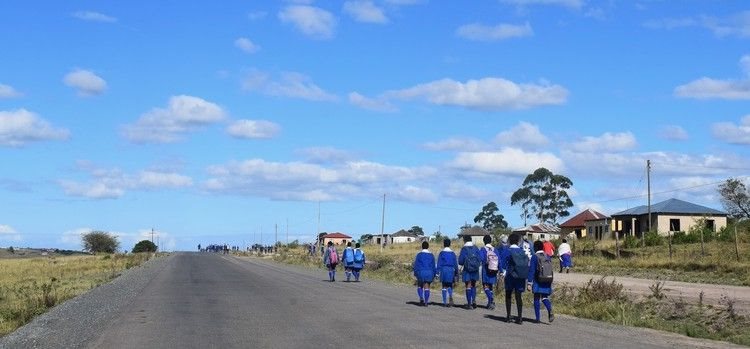Eastern Cape transport and education departments are being taken to court.

School children walk home from school near Canzibe in the Eastern Cape. Photo: Lucas Nowicki
- The Eastern Cape department of transport and education are being taken to court for failing to provide scholar transport for thousands of children.
- In court papers, Khula Community Development Project, the first applicant, estimates 50,000 learners in the province are without transport for school.
- Three no-fees schools are also applicants in the case.
- The transport department says it has insufficient funds.
Three no-fees schools and an education organisation are taking the Eastern Cape departments of education and transport to court for failing to supply scholar transport for an estimated 50,000 eligible learners.
Khula Community Development Project (an NGO based in Peddie advocating for access to schools for children in poor communities), Mneketshe Junior Secondary, and Seaview and Toyise Senior Secondary schools, represented by the Legal Resource Centre (LRC), recently filed an urgent application in the Makhanda High Court.
They are demanding the departments provide scholar transport for their learners and thousands more across the province. They also want catch-up support for those learners who missed school because they had no transport.
The applicants want the court to order the departments to decide on and finalise outstanding applications for scholar transport within 15 days of an order being granted; to provide reasons for rejecting any application and allow for an appeal; and to provide the transport within 10 days for successful applications.
The court is also being asked to declare that the department’s failure to implement its scholar transport policy amounts to a violation of learners’ right to education.
Mneketshe Junior Secondary, a no-fees public school in Mantlane near Flagstaff, serves villages in a 10km radius, according to a supporting affidavit filed by Nkosiphendule Ndlebehangu, the school governing body (SGB) chairperson. Over 140 learners need transport. Learners should qualify for transport if they live more than 5km from the nearest public school. The school has never benefited from the scholar transport programme.
“Learners from three villages have to walk more than 5km through bushes, streams and a river to get to school. This is unsafe.”
“During the rainy season, parents put learners’ school bags, uniforms, towels and lotions into buckets and drums and carry these across the river,” said Ndlebehangu.
Desperate parents tried to come together to organise private transport, but this only lasted two months, as nearly all the parents are unemployed and rely on social grants, said Ndlebehangu.
For over a decade, the school’s requests for transport received no response. This led to many learners dropping out, or having to leave their parents and try to find accommodation closer to the school, he stated.
In 2022 and 2023, the school applied for learner transport through the South African School Administration and Management System, which manages learners’ applications, but received no response.
In 2023, parents and the school set up a makeshift satellite school in a one-room dilapidated mud structure to try to counter the high absenteeism and dropout rates. It was neither funded nor sanctioned by the education department, which meant the SGB had to pay the teachers with its limited resources.
In 2024, the school was informed that only 45 of 143 learners it had identified for scholar transport would be catered for, and the school had to select them. But Ndlebehangu said no further communication was received as to when transport would begin for the 45 learners.
The court papers, drawing on figures from Parliament, state that on average between 2018 and 2022, 19,000 learners lacked transport.
The papers cite Premier Oscar Mabuyane saying the province can only afford to transport 90,000 learners for 2024. This would leave 50,000 learners without transport, according to the founding affidavit of Petros Majola, Khula Community Development director. He said systemic failures included recurring non-payment of transport service providers.
Provincial education spokesperson Mali Mtima told GroundUp scholar transport falls under the mandate of the transport department, but the education department will establish “catch up classes”.
Provincial transport spokesperson Unathi Binqose told GroundUp the department is opposing the application for a “structural interdict, which requires the court to supervise the department on the provision of scholar transport”.
He said the departments are undertaking a verification exercise to determine whether the three schools cited in the application qualify.
“If they qualify, their application will not be opposed,” said Binqose.
Regarding the 50,000 figure cited, he said, “We are not sure how they reached this number, but it is certainly not what we have on our database.”
Binqose said a lack of funds was the main obstacle and the department had reached out to Treasury for more funding.
According to the LRC, the South African Human Rights Commission has applied to join the case. A court date is yet to be set.


















































